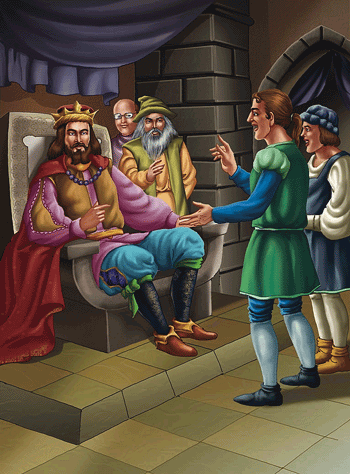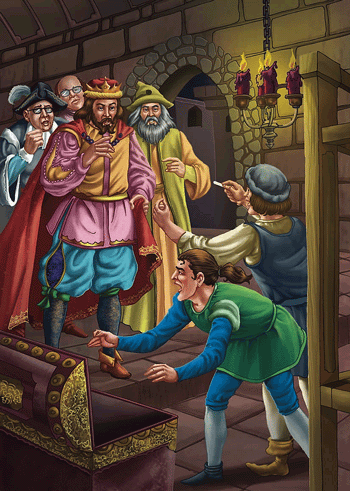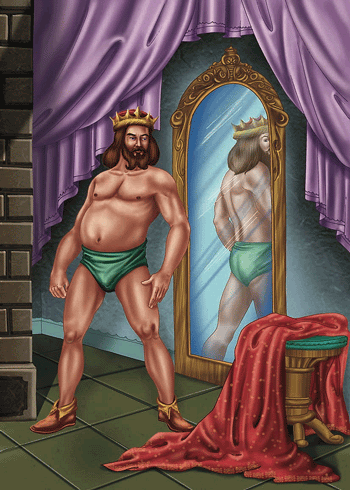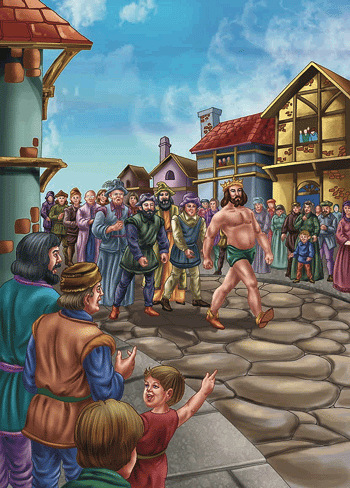Story: The Emperor and his New Clothes
("The Emperor's New Clothes" by Hans Christian Andersen is a fable about the pitfalls of political self-aggrandizement and the fear of people to face reality even when they know that the reality of the situation is untrue)
Although this story is essentially what was written by Hans Christian Andersen, it has been modified in a few places to emphasize some of the realities of our modern age.
The emperor is tricked by private contractors to spend his subject's money on a non-existent "fabric of dreams". The parable ends with a lesson that we should be honest instead of blindly following the irrational, ego centric positions of misguided leaders. The "leader" may include a political, business, educational, or someone in any organization where the "chief official" is obviously misinformed.
It took the honesty and innocent practicality of a child to point out the reality of what was going on because all of the people in high positions, as well as the general population, refused to admit the truth about the obvious false situation in which they found themselves.
The Emperor's New Clothes
The story of a self-centered emperor who thinks only about himself and shows no concern about his people
Many, many years ago there was an emperor who was so terribly fond of beautiful new clothes and how they contributed to his self esteem that he spent all his money on his attire. He did not care about his soldiers, or attending the theater, or even going for a drive in the park, unless it was to show off his new clothes. He had an outfit for every hour of the day. And just as we say, "The king is in his council chamber," his subjects used to say, "The emperor is in his clothes closet."
In the large town where the emperor's palace was, life was gay and happy; and every day new visitors arrived. One day two "private-contractors" came. They told everybody that they were weavers and that they could weave the most marvelous cloth. Not only were the colors and the patterns of their material extraordinarily beautiful, but the cloth had the strange quality of being invisible to anyone who was unfit for his office or unforgivably stupid.

"This is truly marvelous," thought the emperor. "Now if I had robes cut from that material, I should know which of my councilors was unfit for his office, and I would be able to pick out my clever subjects myself. They must weave some material for me!" And he gave the contractors a lot of money so they could start working at once.
The contractors started their deceptive "work"
They set up a loom and acted as if they were weaving, but the loom was empty. The fine silk and gold threads they demanded from the emperor were never used, but they hid them in their own knapsacks. Late into the night they would sit before their empty loom, pretending to weave.
"I would like to know how far they've come," thought the emperor; but his heart beat strangely when he remembered that those who were stupid or unfit for their office would not be able to see the material. Not that he was really worried that this would happen to him. Still, it might be better to send someone else the first time and see what he would report. Everybody in town had heard about the cloth's magic quality and most of them could hardly wait to find out how stupid or unworthy their neighbors were.
The emperor sent his most "trusted" government agents to investigate the contract work in progress
"I shall send my faithful prime minister to see the weavers," thought the emperor. "He will know how to judge the material, for he is both clever and fit for his office, if any man is."
The good-natured old man stepped into the room where the weavers were working and saw the empty loom. He closed his eyes, and opened them again. "God preserve me!" he thought. "I cannot see a thing!" But he didn't say it out loud.
The private contractors asked him to step a little closer so that he could admire the intricate patterns and marvelous colors of the material they were weaving. They both pointed to the empty loom, and the poor old prime minister opened his eyes as wide as he could; but it didn't help, he still couldn't see anything.
"Am I stupid?" he thought. "I can't believe it, but if it is so, it is best no one finds out about it. But maybe I am not fit for my office. No, that is worse, I'd better not admit that I can't see what they are weaving."
"Tell us what you think of it," demanded one of the contractors.
"It is beautiful. It is very lovely," mumbled the old prime minister, adjusting his glasses. "What patterns! What colors! I shall tell the emperor that I am greatly pleased."
"And that pleases us," the weavers said; and now they described the patterns and told which shades of color they had used. The prime minister listened attentively, so that he could repeat their words to the emperor, and that is exactly what he did.
Typically, the two contractors demanded more money, and more silk and gold thread. They said they had to use it for their weaving, but their nonexistent loom remained as empty as ever.
Soon the emperor sent another of his trusted councilors to see how the work was progressing. He looked and looked just as the prime minister had, but since there was nothing to be seen, he didn't see anything.
"Isn't it a marvelous piece of material?" asked one of the contractors; and they both began to describe the beauty of their cloth again.
"I am not stupid," thought the emperor's councilor. "I must be unfit for my office. That is strange; but I'd better not admit it to anyone." And he started to praise the material, which he could not see, for the loveliness of its patterns and colors.
"I think it is the most charming piece of material I have ever seen," declared the councilor to the emperor.
The deceptions of the government officials spread to the citizen victims
Everyone in town was talking about the marvelous cloth that the contractors were weaving.
At last the emperor himself decided to see it while it was still on the loom. Attended by the most important people in the empire, among them the prime minister and the councilor who had been there before, the emperor entered the room where the weavers were weaving furiously on their imaginary empty loom.
Some of the cloth was supposedly already done and in the trunk; so the contractors pretended to show the Emperor some of the magical clothing material.
"Isn't it magnificent?" asked the prime minister.
"Your Majesty, look at the colors and design," said the councilor. And the two old gentlemen pointed to the cloth, believing that all the rest of the company could see it, too.

"What!" thought the emperor. "I can't see a thing! This is terrible! Am I a fool? Am I unfit to be emperor? Oh, it is too horrible!"
"Oh, it is beautiful!" said the emperor. "It has my highest approval!" and he nodded his satisfaction as he gazed at the empty loom. Nothing would induce him to say that he could not see anything.
All the councilors, ministers, and men of great importance who had come with him stared and stared; but they saw no more than the emperor had seen, and they said the same thing that he had said, "It is very beautiful!" and they advised him to wear a suit made of this wonderful cloth, so that he could wear it in the great procession which was just about to take place.
"It is magnificent! Gorgeous! Excellent!" All of them were in agreement, although none of them could see anything. The emperor gave each of the rogues an order of knighthood to be worn in their buttonholes and the title of "Gentlemen Weavers."
The government contractors extended their deceitful activities
The night before the procession, the two contractors didn't sleep at all. They had sixteen candles lighting up the room where they worked. Everyone could see how busy they were, getting the emperor's new clothes finished. They pretended to take cloth from the loom; they cut the air with their big scissors, and sewed with needles without thread. At last they announced: "The emperor's new clothes are ready!"
Together with his courtiers, the emperor came. The contractors lifted their arms as if they were holding something in their hands, and said, "These are the trousers. This is the robe, and here is the train. They are all as light as if they were made of spider webs! It will be as if Your Majesty had almost nothing on, but that is their special virtue."
"Oh yes," breathed all the courtiers; but they saw nothing, for there was nothing to be seen.
"Will Your Imperial Majesty be so gracious as to take off your clothes?" asked the contractors. "Over there by the big mirror, we shall help you put your new ones on."
The emperor did as he was told; and the contractors acted as if they were dressing him in the clothes they should have made. Finally they tied around his waist the long train which two of his most noble courtiers were to carry.

The emperor stood in front of the mirror admiring the clothes he couldn't see.
"Oh, how they suit you! A perfect fit!" everyone exclaimed. "What colors! What patterns! The new clothes are magnificent!"
"The people are waiting for you to come outside," said the imperial master of court ceremony.
"Well, I am dressed. Aren't my clothes becoming?" The emperor turned around once more in front of the mirror, pretending to study his finery.
The two gentlemen of the imperial bedchamber fumbled on the floor trying to find the train which they were supposed to carry. They didn't dare admit that they didn't see anything, so they pretended to pick up the train and held their hands as if they were carrying it.
The fraud and deceptive activities were finally revealed by someone who was not afraid to speak the truth
The emperor walked in the procession and all the people of the town, who had lined the streets or were looking down from the windows, said that the emperor's new clothes were beautiful. "What a magnificent robe! And the train! How well the emperor's clothes suit him!"
None of them were willing to admit that they hadn't seen a thing; for if anyone did, then he was either stupid or unfit for the job he held. Never before had the emperor's clothes been such a success.

"But he doesn't have any clothes on except his underpants!" cried a little child.
"Listen to the innocent one," said the proud father. And the people whispered to each other and repeated what the child had said.
"He doesn't have any clothes on. There's a little child who says that he's not wearing any clothing."
"He has no clothes on! He's practically naked!" shouted all the people at last.
The emperor was shaking from the sudden tension in which he finally realized the truth of the situation, because he was certain that they were right; but he thought, "The procession must go on now," so he held himself prouder than ever, and the chamberlains continued to pretend holding up the invisible train behind him despite being exposed by the child.
The political swindles have continued on into our modern times
Do you see any similarities with what is going on with our current government officials who get their "kickbacks" from contractors as they continue to promote their deceptions?
On July 4, 2007, the Los Angeles Times revealed that: The number of U.S. paid private contractors in Iraq now exceeds that of American combat troops, newly released figures show, raising fresh questions about the privatization of the war effort and the government's capacity to carry out military and rebuilding campaigns.
More than 180,000 civilians; including Americans, foreigners and Iraqis, are working in Iraq under U.S. contracts, according to State and Defense department figures obtained by the Los Angeles Times.
Including the recent troop buildup, 160,000 soldiers and a few thousand civilian government employees are stationed in Iraq.
Military contracting expert, Peter Singer, gives a significant quote: "This is not the coalition of the willing. It's the coalition of the billing."
